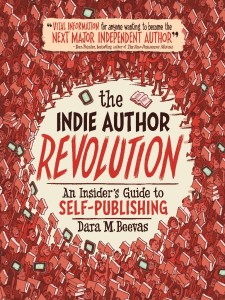The following is a guest post by Dara Beevas.
 I decided when I first began writing my book that the title would be From Passion to Print: An Insider’s View into Self-Publishing. I didn’t think it was too bad. I loved the word “passion” and I was bent on incorporating it.
I decided when I first began writing my book that the title would be From Passion to Print: An Insider’s View into Self-Publishing. I didn’t think it was too bad. I loved the word “passion” and I was bent on incorporating it.
Why? I can’t say exactly why, but I was fixated on the word. I couldn’t let it go.
However, very close to the finish line I had this gnawing feeling that my title was just okay. I heard my gut say I could do better. So I did what most nervous writers do: I asked the peanut gallery.
Everyone including Amy, my fellow Wise, Ink partner confirmed my fears. The verdict: My instincts were right. I needed a more exciting title.
They agreed that my chosen tile was perfectly fine and that I wasn’t doing my content an injustice. BUT…they agreed that a better title alternative lay waiting to be discovered.
So the journey began.
One day in my office with Amy and another colleague, we tossed ideas around for what seemed like hours. After title ideas like Publish for Profit (cheesy) and 101 Tips for the Indie Author (boring) didn’t make the cut, we went back to the drawing board.
We went to work listing the words that we felt my readers would respond to, be empowered by, and that would prompt action.
We finally settled on The Indie Author Revolution.
It was a cool author moment when I knew I had finally found the right title. I attribute my experience to my original gut feeling paired with the honest feedback of folks who also knew my audience.
It was a long and harrowing process to settle on what ultimately became my title, but here’s what I learned:
1. Don’t jump on the first title that sounds good
Ask yourself the following question: Will my title intrigue, excite, or engage my readers? If you have any doubt about that, generate more ideas and don’t be afraid to have a few (emphasis on few) folks weigh in.
2. Research your audience
Is your audience primarily women, working professionals, college-educated, literary types? Once you know exactly who your audience is, it’ll be easier to eliminate titles that won’t sell them on your content.
3. Start with a list
A list is the best place to start. Even if you know an idea is unlikely to make the final cut, write it down anyway. It might lead you closer to the right title.
4. Go in the direction of emotion
Most readers are emotionally-driven in their book purchases. What are their needs? Are they searching for a fast solution? I felt my audience would emotionally be drawn to the idea of an empowering community. What title effectively satisfies your audience’s emotional requirements.
5. Short and Sweet is Better than Long and Explanatory
My earliest titles were too long. Some experts recommend five to seven-word titles. I recommend three to five. The shorter the better and going shorter will force you to be specific and direct.
6. Check Amazon
It’s not uncommon to see multiple books with the same title (and it isn’t copyright infringement to choose a title that’s taken). But, it’s good to know which books, if any, are using your book’s title or come close. I recommend trying to go in the direction of originality.
7. Is the Domain Available?
Check if the title is available on a site like domai.nr. If it isn’t, don’t sweat it. Your website’s domain name can be your name or some version of your book title. If it is available, purchase it even if you don’t have immediate plans for it — it could come in handy later.
8. Test
Proceed with caution in sharing your title (and cover design) with everyone in your networks (particularly on Facebook and other social media sites). Instead choose a small number of people who are objective, know your audience, and are readers themselves! I like booksellers, librarians, industry experts, published authors and book reviewers as resources to test.
9. Include the “promise”
Try to include your book’s promise in your title (in the subtitle for nonfiction authors) so a reader knows what to expect. Abstract and ambiguous titles have their place, especially with fiction titles, but there’s likely a keyword or image that best connects with your book’s promise.
10. Go with Your Gut
If you have a sneaking suspicion that your title lacks pizazz, listen to yourself. On the other hand, if you feel in your gut that your title is “the one” don’t underestimate that either. Bottom Line: there’s no single magic title that if NOT selected dooms your book to the bargain barrel. Ultimately have fun and pay attention to the signs.
Talk Back
So how did you select your book’s title? Did you select your title first and then beginning writing?
 Dara M. Beevas is the author of The Indie Author Revolution: An Insider’s Guide to Self-Publishing. As vice president of award-winning Beaver’s Pond Press, she has mentored hundreds of authors through the publishing process. She’s also co-founder of Wise Ink, a blog for the indie author community.
Dara M. Beevas is the author of The Indie Author Revolution: An Insider’s Guide to Self-Publishing. As vice president of award-winning Beaver’s Pond Press, she has mentored hundreds of authors through the publishing process. She’s also co-founder of Wise Ink, a blog for the indie author community.
 We're
We're 








